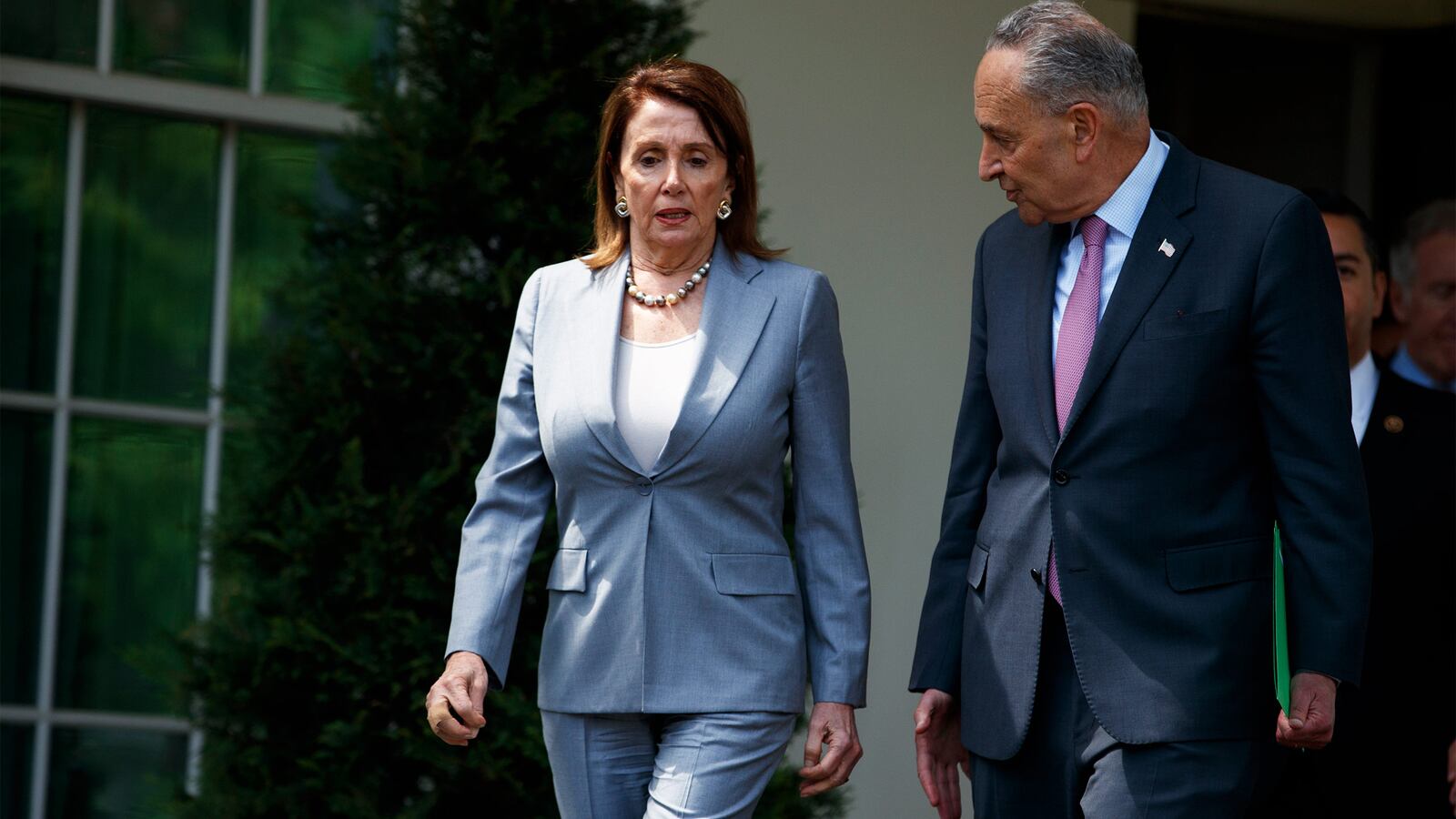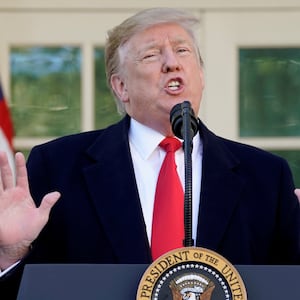Things were loose and light at the White House on Tuesday as President Donald Trump hosted House Speaker Nancy Pelosi, Senate Minority Leader Chuck Schumer, and a delegation of Democratic lawmakers for a meeting billed as a discussion of infrastructure policy.
The president handed out Tic Tacs, peppered a Michigan lawmaker with questions about invasive fish, got reprimanded by Pelosi for having a loud side-conversation with Schumer, and even declared that he wanted a bill that “may not be typically Republican.” One source familiar with the meeting called it “uncharacteristically muted.” And when it ended, the parties had come to an unexpected agreement on a $2 trillion price tag for an infrastructure package—an ambitious, tentative agreement that is widely expected to hit the skids.
It was a rare bit of ostensible productivity made all the more remarkable for the fact that it came in the middle of the stormiest stretch yet for relations between Democrats and the president. There was, on Tuesday, no mention of Democrats having spent the last two weeks debating whether to impeach the president, or that the administration was in the middle of an epic stonewall of Democratic subpoenas and requests for documents, or that Trump’s personal lawyers had filed a lawsuit against the Democratic chairman of the House Oversight Committee.
“I thought it was very positive,” said Rep. Peter DeFazio (D-OR), chairman of the House Transportation Committee, of the meeting. “It was not a traditional conversation, talking Democrat-Republican. It was about getting stuff done.”
But comity is not always a shared objective throughout politics. And no sooner had the meeting concluded than Democrats were wondering why their party’s leadership had called it in the first place.
“He’s an incumbent president,” Adam Jentleson, a top aide to former Senate majority leader Harry Reid, told The Daily Beast. “The strategy should be to explain to voters that he shouldn’t be re-elected and not give him reasons why he should be elected.”
“Why hand him a press conference that he derives far more value out of than Dems do in a week when the other news is him defying congressional oversight and him relitigating his Charlottesville comments?” he continued. “Democratic leaders are just profoundly scared of going toe to toe with Trump and want to find a way to work around him. But that’s just not possible in an election cycle when he is the incumbent president.”
Since winning back the House majority, Democrats have grappled with balancing their newfound power to provide real oversight and resistance of the Trump administration with the reality that if they want to pass anything into law, Trump’s signature is needed.
Tuesday’s meeting was the latest evidence that Democrats still haven’t found agreement about what that balance looks like—and that Trump’s looming reelection campaign is sparking strategic handwringing within a party that wants to defeat him but to pad their own résumé, too. Asked, for instance, about the fear expressed from some Democrats that a big bipartisan infrastructure package could considerably boost the president’s re-election chances, a senior House Democratic aide replied with exasperation.
“You know what, who gives a fuck?” the aide said. “Who. Gives. A. Fuck?... We ran on the issue of infrastructure. So I don’t know why it would be a surprise to anyone that if we can get a bill done we’d be advocating for that. We are not Republicans. We don’t put politics ahead of getting something done for our constituents. That’s not what we do.”
If there were ever low-hanging fruit for win-win cooperation on a shared policy goal, it would be infrastructure. Since Trump took office, Democrats have hoped that the real-estate mogul would eschew conservative dogma and embrace a high-dollar federal reinvestment in roads, bridges, airports, and more.
But the lack of progress has turned the issue into something of a Washington punchline. “Infrastructure Week,” and its various iterations, has amounted to a running inside joke among the White House senior staff, with Trump’s aides mockingly saying, “Happy Infrastructure Week!” at one another whenever the president would revive his infrastructure-spending talk or tweets, according to former and current officials.
Whenever Trump would demand that this be made a priority of the week or hour, White House aides would roll their eyes and few, if any, would take it seriously.
To Trump allies, the new Infrastructure Week feels a lot like the old Infrastructure Weeks: destined for inertia at best, implosion at worst. And practically everyone in the Trump orbit sees Democratic leadership as imitating progress without really wanting to give the president a policy win. A senior White House official characterized the situation grimly to The Daily Beast, saying that “people [in the Trump administration] who say that this time it’s going somewhere are lying to you,” and rhetorically asking: “How many times do we have to go through this?”
The exasperation is shared by Democratic lawmakers, some of whom stopped just short of declaring Tuesday’s meeting a total waste of time and effort. They cited past instances where the president unexpectedly endorsed their ideas during freewheeling White House meetings—like an assault weapons ban in 2018—only to revert to the GOP line later.
“I would love to be surprised,” said Sen. Brian Schatz (D-HI). “But there’s no reason to think this situation is any different than the previous 10 discussions and negotiations we’ve had in which you cannot nail down the administration’s position, and they episodically blow it all up, all the way up until the end, and then they blow it up finally.”
But other Democrats were quick to declare the infrastructure talks as a win-win and maintained that Pelosi, ever the strategist, has a plan at work in winning a three-dimensional political chess game on the issue. “She and Dems have nothing to lose by engaging him on infrastructure,” a Democratic strategist told The Daily Beast. “They ran on it, he wants it, and if he can’t deliver, it won’t be the Democrats who couldn’t get it done.”
Even if Trump and Democrats do deliver on a sweeping infrastructure package—handing the president a huge win heading into his reelection—a lot of Democrats said it would be worth it. “Our job is to get things done for the people, period, full stop,” said Rep. Hakeem Jeffries (D-NY), the Democratic Caucus chairman, when asked about the political risks. “The political chips will fall where they may.”
But if the spirit of bipartisanship was in abundant supply on Tuesday, the details were not. Even the more optimistic Democratic lawmakers acknowledge that fundamental elements of a proposal—such as how to pay for the infrastructure investment—remain incredibly vague.
Trump on Tuesday assured Democrats in the room the he would “lead on this.” And the expectation among aides was that the president and his Treasury Secretary, Steve Mnuchin, would come up with a list of pay-fors before talks could substantively move forward.
For more cynical-minded Democrats, that was, perhaps, the point of Tuesday’s gathering: not just to showcase that Democratic leadership wasn’t monomaniacally focused on oversight investigations but also to put the pressure on Trump to deliver, knowing he likely couldn’t.
“I think [Democrats are] betting this will die one way or another,” said former Reid aide Jim Manley, “whether because of Trump's incompetence or because it goes down in the Senate.”









